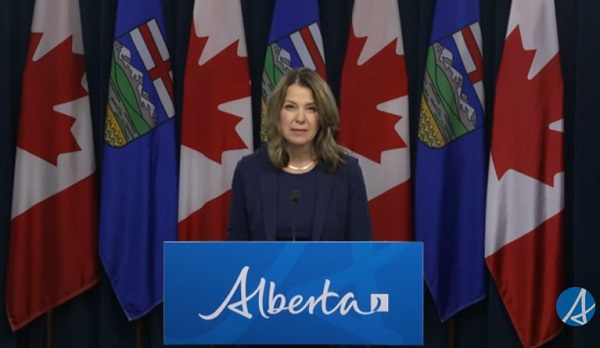Alberta
Watch: Provincial Review Panel tees off on Supervised Consumption Sites

From The Province of Alberta
Impact of supervised consumption sites report released
The final report of the expert-led Supervised Consumption Services Review Committee is now available online.
The Supervised Consumption Services Review Committee listened to more than 19,000 Albertans’ concerns about the impacts supervised consumption services (SCS) sites are having on their homes, businesses and neighbourhoods.
The final report contains the committee’s findings regarding needle debris, social disorder, public safety and other concerns. The committee found serious problems with supervised consumption services as they are currently being operated, and provided thoughtful considerations for improving services and community safety, while building a comprehensive recovery-oriented system of care that offers the greatest chance to lift vulnerable Albertans with addiction out of their current plight.
“This report is a wake-up call for Alberta. Every one of us deserves to feel safe in our communities, and every Albertan struggling with addiction should be able to access the supports they need. We will consider this report, and all other relevant evidence, as we develop a comprehensive, long-term approach that works. That means improving addiction treatment services and supports to create a full continuum of care across the province.”
“Crime grows in areas where illegal drug use is on the rise. Our government supports a firm justice system that includes investigating, disrupting and dismantling the organized crime groups that supply and sell illegal drugs that fuel addiction, ruin people’s lives and take a terrible toll on our communities. We’ll continue to ensure law enforcement and the justice system have the tools and resources to protect community safety.
“Thank you to all Albertans who participated in this process. Our committee was given a mandate to hear from people across the province on all sides of this important issue. The findings in this report demonstrate the compassion many Albertans feel for their neighbours and their commitment to creating safe, welcoming communities for everyone.”
“Our committee heard from thousands of passionate Albertans, and reviewed a wide range of data and evidence sources to examine what impact these services are having on the communities around them. The findings may be difficult for some to hear, but are vital to improving the health and well-being of those who use the sites and those who live in surrounding neighbourhoods.”
Key findings from the report include:
- Increased needle debris and deteriorating public safety around the sites were significant concerns raised during the town halls, through the surveys and in stakeholder meetings.
- While there were no deaths recorded among people at the SCS sites, death rates in the immediate vicinity of the sites after the sites opened continued to increase along with province-wide rates of opioid deaths.
- Opioid-related calls for emergency medical services also increased in the immediate vicinity following the opening of the sites.
- Many people indicated they felt less safe in the areas surrounding the SCS sites after they opened.
- Lack of focus on referrals to detoxification and treatment resources.
- Inconsistent and often inaccurate classification of “overdose reversals.”
- Substantial increases in the use of non-opioid substance use, specifically methamphetamines, leading to aggressive behaviour endangering public safety.
Over the coming months, the government will consider changes to supervised consumption services and other addiction treatment and recovery resources, on a city-by-city basis.
Quick facts
- The eight-member committee included First Nations people, experts in addiction and recovery, harm reduction, mental health, trauma, pain management, law enforcement, crime reduction and justice, as well as people with lived experience.
- 16,831 individuals and 440 businesses submitted feedback to the committee through an online survey.
- About 1,800 people attended the town halls in Edmonton, Red Deer, Calgary, Lethbridge, Medicine Hat and Grande Prairie.
- More than 500 first responders and more than 50 stakeholder groups provided evidence and shared concerns with the committee.
Alberta
B.C. would benefit from new pipeline but bad policy stands in the way

From the Fraser Institute
By Julio Mejía and Elmira Aliakbari
Bill C-69 (a.k.a. the “no pipelines act”) has added massive uncertainty to the project approval process, requiring proponents to meet vague criteria that go far beyond any sensible environmental concerns—for example, assessing any project’s impact on the “intersection of sex and gender with other identity factors.”
In case you haven’t heard, the Alberta government plans to submit a proposal to the federal government to build an oil pipeline from Alberta to British Columbia’s north coast.
But B.C. Premier Eby dismissed the idea, calling it a project imported from U.S. politics and pursued “at the expense of British Columbia and Canada’s economy.” He’s simply wrong. A new pipeline wouldn’t come at the expense of B.C. or Canada’s economy—it would strengthen both. In fact, particularly during the age of Trump, provinces should seek greater cooperation and avoid erecting policy barriers that discourage private investment and restrict trade and market access.
The United States remains the main destination for Canada’s leading exports, oil and natural gas. In 2024, nearly 96 per cent of oil exports and virtually all natural gas exports went to our southern neighbour. In light of President Trump’s tariffs on Canadian energy and other goods, it’s long past time to diversify our trade and find new export markets.
Given that most of Canada’s oil and gas is landlocked in the Prairies, pipelines to coastal terminals are the only realistic way to reach overseas markets. After the completion of the Trans Mountain Pipeline Expansion (TMX) project in May 2024, which transports crude oil from Alberta to B.C. and opened access to Asian markets, exports to non-U.S. destinations increased by almost 60 per cent. This new global reach strengthens Canada’s leverage in trade negotiations with Washington, as it enables Canada to sell its energy to markets beyond the U.S.
Yet trade is just one piece of the broader economic impact. In its first year of operation, the TMX expansion generated $13.6 billion in additional revenue for the economy, including $2.0 billion in extra tax revenues for the federal government. By 2043, TMX operations will contribute a projected $9.2 billion to Canada’s economic output, $3.7 billion in wages, and support the equivalent of more than 36,000 fulltime jobs. And B.C. stands to gain the most, with $4.3 billion added to its economic output, nearly $1 billion in wages, and close to 9,000 new jobs. With all due respect to Premier Eby, this is good news for B.C. workers and the provincial economy.
In contrast, cancelling pipelines has come at a real cost to B.C. and Canada’s economy. When the Trudeau government scrapped the already-approved Northern Gateway project, Canada lost an opportunity to increase the volume of oil transported from Alberta to B.C. and diversify its trading partners. Meanwhile, according to the Canadian Energy Centre, B.C. lost out on nearly 8,000 jobs a year (or 224,344 jobs in 29 years) and more than $11 billion in provincial revenues from 2019 to 2048 (inflation-adjusted).
Now, with the TMX set to reach full capacity by 2027/28, and Premier Eby opposing Alberta’s pipeline proposal, Canada may miss its chance to export more to global markets amid rising oil demand. And Canadians recognize this opportunity—a recent poll shows that a majority of Canadians (including 56 per cent of British Columbians) support a new oil pipeline from Alberta to B.C.
But, as others have asked, if the economic case is so strong, why has no private company stepped up to build or finance a new pipeline?
Two words—bad policy.
At the federal level, Bill C-48 effectively bans large oil tankers from loading or unloading at ports along B.C.’s northern coast, undermining the case for any new private-sector pipeline. Meanwhile, Bill C-69 (a.k.a. the “no pipelines act”) has added massive uncertainty to the project approval process, requiring proponents to meet vague criteria that go far beyond any sensible environmental concerns—for example, assessing any project’s impact on the “intersection of sex and gender with other identity factors.” And the federal cap on greenhouse gas (GHG) emissions exclusively for the oil and gas sector will inevitably force a reduction in oil and gas production, again making energy projects including pipelines less attractive to investors.
Clearly, policymakers in Canada should help diversify trade, boost economic growth and promote widespread prosperity in B.C., Alberta and beyond. To achieve this goal, they should put politics aside, focus of the benefits to their constituents, and craft regulations that more thoughtfully balance environmental concerns with the need for investment and economic growth.
Alberta
Alberta introduces bill allowing province to reject international agreements

From LifeSiteNews
Under the proposed law, international treaties or accords signed by the federal government would not apply in Alberta unless approved through its own legislation.
Alberta’s Conservative government introduced a new law to protect “constitutional rights” that would allow it to essentially ignore International Agreements, including those by the World Health Organization (WHO), signed by the federal Liberal government.
The new law, Bill 1, titled International Agreements Act and introduced Thursday, according to the government, “draws a clear line: international agreements that touch on provincial areas of jurisdiction must be debated and passed into law in Alberta.”
Should the law pass, which is all but certain as Alberta Premier Danielle Smith’s Conservatives hold a majority government, it would mean that any international treaties or accords signed by the federal government would not apply in Alberta unless approved through its own legislation.
“As we return to the legislature, our government is focused on delivering on the mandate Albertans gave us in 2023 to stand up for this province, protect our freedoms and chart our path forward,” Smith said.
“We will defend our constitutional rights, protect our province’s interests and make sure decisions that affect Albertans are made by Albertans. The federal government stands at a crossroads. Work with us, and we’ll get things done. Overstep, and Alberta will stand its ground.”
According to the Alberta government, while the feds have the “power to enter into international agreements on behalf of Canada,” it “does not” have the “legal authority to impose its terms on provinces.”
“The International Agreements Act reinforces that principle, ensuring Alberta is not bound by obligations negotiated in Ottawa that do not align with provincial priorities,” the province said.
The new Alberta law is not without precedent. In 2000, the province of Quebec passed a similar law, allowing it to ignore international agreements unless approved by local legislators.
The Smith government did not say which current federal agreements it would ignore, but in theory, it could apply to any agreement Canada has signed with the United Nations or the WHO.
-

 Business22 hours ago
Business22 hours agoTrans Mountain executive says it’s time to fix the system, expand access, and think like a nation builder
-

 Business2 days ago
Business2 days agoCarney government risks fiscal crisis of its own making
-

 Energy22 hours ago
Energy22 hours agoCAPP calls on federal government to reset energy policy before it’s too late
-

 Alberta2 days ago
Alberta2 days agoB.C. would benefit from new pipeline but bad policy stands in the way
-

 Frontier Centre for Public Policy2 days ago
Frontier Centre for Public Policy2 days agoChurches Are All That Stands Between Canada And Tyranny
-

 Alberta2 days ago
Alberta2 days agoAlberta introduces bill allowing province to reject international agreements
-

 Media15 hours ago
Media15 hours agoCarney speech highlights how easily newsrooms are played by politicians announcing the same things over and over again
-

 Business2 days ago
Business2 days agoTrump Admin Establishing Council To Make Buildings Beautiful Again




